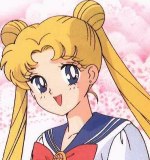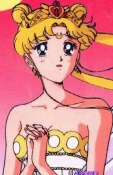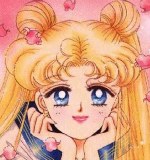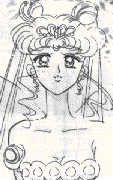Japanese Words and Phrases
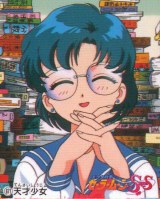
Welcome! I have put together a list of common words and phrases used when refering to anime and manga.
| - Please note: I am not currently in, and have never taken, a class in Japanese. All of these terms have been gathered from other websites, books, and my tomodachi Aaron helped me with correcting several, and gave me a ton more to add. He is currently taking Japanese at school. I have also used my "Japanese Fundamentals" sheets that contain many useful items. |
| - Also notice that if there is a oo or a ou those can be interchanged. |
| - If you find ANY errors, please e-mail me with the correction. |
|
|||
|
|||
|
|||
|
|||
|
|||
|
|||
|
|||
|
|||
|
|||
|
|||
|
|||
|
Other sites:
|
|||
|
|||
|
Basic Anime and Manga
People
| I or me | watashi | |
| my | watashi no (followed by a noun) | |
| a voice actor - the person who reads the lines of a certain character | seiyuu | |
| a pretty girl | bishoujo/ bishojo |
Bishoujo Senshi Sailor Moon >> Pretty Soldier Sailor Moon
|
| bishounen/ bishonen | ||
| handsome young man over 16 years old | bisheinen | |
| girl | ||
| boy | shonen/shounen | |
| young man over 16 | sheinen | |
| literal meaning is a polite form of "you", but the word took on the meaning of a (very) obsessed fan in Japanese, in other languages it's a popular way of calling yourself an anime fan | otaku |  |
| manga artist | manga-ka | |
| friend |
Tobias is my tomodachi. >> Tobias is my friend.
|
|
| senpai | ||
| everyone | minna |
Konnichiwa minna! >> Hi everyone!
Konnichiwa minna-san!
|
Talking about your family to others:
| father | |
| mother | haha |
| ani | |
| older sister | ane |
| grandfather | sohu |
| sobo |
Name Endings
| -chan |
Ami-chan, Mako-chan
|
|
Konnichiwa minna-san
|
||
| most polite ending on names - teachers, respected peers, adults |
Queen Beryl-sama
|
Numbers
| 1 | ichi |
| 2 | ne |
| 3 | san |
| 4 | shi (or yon) |
| 5 | go |
| 6 | roku |
| 7 | |
| 8 | hachi |
| 9 | |
| 10 | juu |
Descriptive Words
| small, a short person, kid, diminutive, a style of drawing where the characters are smaller than normal size, sometimes expressed as SD for super-deformed | chibi | 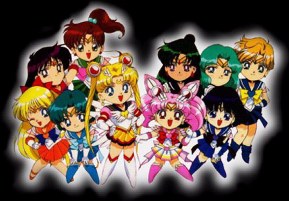 |

|
||
| cute | ||
| cool, amazing | ||
| funny | ||
| dirty | ||
| little |
Conversational Words
| hello on telephone | ||
| informal good morning | ohayo | |
| formal good morning | ohayo gazaimasu | |
| hello, till the afternoon |
often used on websites to greet visitors
|
|
| good evening | konbanwa | |
| informal good night | oyasumi | |
| formal good night | ||
| casual goodbye, even saying it to a class man one year older than you is horribly impolite | ja mata ne | |
| extremely casual goodbye, even saying it to a class man one year older than you is horribly impolite | ja'ne/ja ne | |
| more formal goodbye | sayoonara | |
| literally- sorry, I did something wrong, I'm sorry | ||
| sorry for a quick mess up (like being a klutz) | ||
| very casual thank you | domo | |
| casual thank you | arigatou |
used on websites to thank visitors for help
|
| thank you very much | ||
| arigatou gaziamasu | ||
| very polite thank you | domo arigatou gaziamasu | |
| yes | hai | |
| no | iie | |
| am, is, are | desu (pronounced des) | |
| used after a noun in the sentence to specify it | wa | |
| used to specify anything non-human as a noun | wo | |
| no |
Heero no onna >> Heero's woman/woman of Heero
|
|
| when | itsu | |
| Yeeoowch! | Itai! | |
| wa! | ||
| phone number | ||
| breakfast | cho sho ku | |
| lunch | chu cho ku | |
| dinner | yu sho ku | |
| meal | shokuji | |
| train | kisha | |
| theater | gekijo | |
| inn | ryokan |
Languages
| English | ||
| The English alphabet, when used to transliterate (romanize) the original Japanese words (all of the Japanese terms here are written in Romaji) | Romaji |
Japanese >> Romanji
|
| Chinese characters as used in Japanese, with different meanings/pronunciations | Kanji | |
| One of the Japanese phonetic alphabets, mainly used for borrowed words, it was created by the government to use in teaching children - easier to write than Hirigana. | ||
| One of the Japanese phonetic alphabets, used for native words, it's the more advanced form of katakana. |
Relationships
| love | ai |
| boy love, guy on guy relationships, gay | yaoi |
| more involved guy relationship | |
| girl love, girl on girl relationships, lesbian | yuri |
| more involved girl relationship | |
| I love you - affectionate rather than passionate | |
| literally- I'm fond of you, you're my favorite (person), I love you In anime, this phrase is usually used when one character makes a proclamation of love to another, especially when it's the first time he/she has said it |
Question Words
| what? | nani ka? | |
| where? | ||
| ...ne ka? |
Sailor Moon is sugoi, ne ka?
|
Short Sentences
| literally- What is your name?, Are you (insert name)? | Anata no namae wa (insert name) desu. | |
| Your name please. | Onamae wa. | |
| My name is (insert name). | Watashi no namae wa (insert name) desu. |
Watashi no namae wa Ami desu. >> My name is Ami.
|
| for first time meeting only- How do you do, my name is (insert name). | Hajimemashite watashi wa (insert name) desu. |
Hajimemashite watashi wa Ami desu. >> How do you do, my name is Ami.
|
| Ogenki desu ka? | ||
| for first time meeting only- literally-please be kind to me, Pleased to meet you. | Doozo yorashiku. | |
| literally- What age are you?, How old are you? | Nan sai desu ka? | |
| to say where you're from, I am (insert name) from (insert place). | Watashi wa (insert place) no (insert name) wa. |
Watashi wa Amerika no Ami wa. >> I am Ami from America.
|
| What grade are you in? | Anata wa nan nensei desu ka? | |
| Yes it is. | Hai so desu. | |
| No it isn't. | Eii chigiamasu. | |
| Wait a minute. | ||
| I don't know/understand. | Wakarimasen. | |
| I understand/know. | Wakarimashita. | |
| I have a question. | ||
| Word wa eego de nandesu ka? |
Sailor Moon Terms
| The enemies that the main enemy (such as Jedite) create in each episode to fight the senshi. | youma |  |
| outfit, uniform often referred to by otakus as "senshi fuku" or "sailor fuku" |
fuku | |
| The Silver Crystal formed from the seven Rainbow Crystals. (Sailor Moon's power comes from this) |
ginzuishou |   |
| The Seven Rainbow Crystals that combine to make the Silver Crystal. They were the Silver Crystal in which Queen Serenity locked the dark shadow that attacked the Moon Kingdom, she then sent it to Earth where the 7 Rainbow Crystals were born into humans (Ryo, Game Machine Joe, Hercules (cat), ect.) | nijzuishou |  |
| transformation into their fuku that takes place when magical words are said (i.e. "Mercury Power, Make Up!"), using a crystal or source of power | henshin |  |
| senshi | 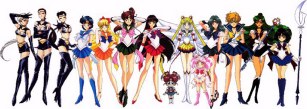 |
|
| For the three pure heart crystals that form the Purity Chalice there are two names used: In the NA dub they are called Treasures. | For the Japanese Version they are called Talisman. |   |
| makaiju | 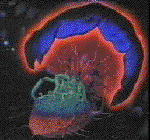 |
